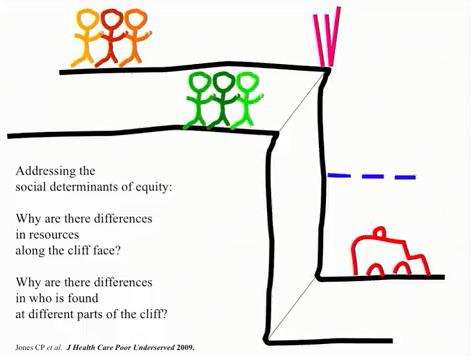Someone recently commented that "Nobody knew health care could be so complicated". Ring any bells?
Actually, many people really do understand how complicated health care is - and they spend every waking hour trying to find solutions to these complex problems, including our featured health commentator today.
One of the "complications" in health care is something called "disparities". Disparities are really "differences" for certain groups of people, particularly women and people of color. There are differences in access to care, the quality of that care and differences in the results.
In reality, some people simply do worse and some do better. So, why do these disparities arise? And what can we do about it?
Most people agree that everyone should have the same quality of care, and that differences are unfair, but it's harder to agree on who or what is at fault. One thing is clear: if you understand how things work you are in a better position to make the best of the situation.
In her recent talk at the Movement is Life Conference, Dr Camara Jones shared her unique method of explaining the complicated way that disparities arise, using stories and pictures. During her talk a clearer picture emerges, as do some solutions. Here are some of the headlines:
+++ We all need to find the courage and the tools to talk about disparities and racism in health.
+++ Good health is like being at the top of a cliff. When people fall off this cliff we start to intervene - often too late.
+++ If we want to dismantle racism in health we have to intervene before people fall - we need to move people away from the edge of the cliff.
+++ We need to accept that there are "social determinants of health." Health is often determined by adverse "social" factors such as poverty, wealth, neighborhood safety, jobs, transportation, and availability of opportunities.
+++ Many things that impact health are out of the control of the individual.
+++ Racial and ethnic health disparities arise in many ways.
+++ "Racism" is often systematic, not just the result of a conscious individual. It is a system of structuring opportunity and assigning value based on how someone looks.
+++ We provide different care to people depending on the color of their skin or if they are male or female. Data shows this is happening all the time and in most places where people get care.
+++ Health care is "distributed" by systems of power, control and management. These systems do not distribute health care evenly.
Dr Jones agrees that discussing the existence of systematic racism in health care is an uncomfortable subject for many people, and that this is one of the reasons that racism in healthcare is not talked about enough.
But as she says, "When I talk about racism I'm talking about a system, not an individual. And we don't want to make anyone uncomfortable. But we cannot any longer make comfort more important than the truth."
